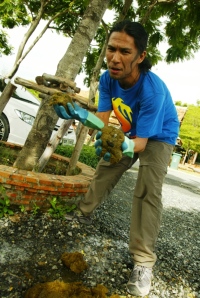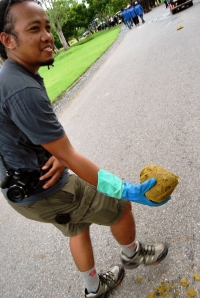
This is our last day in Ancient Siam, which means the last day of the Chang(e) Caravan project, which also means the last day with the elephants (Noooooooo!! But that’s okay, we promise to visit them when we go back to Thailand in the future). The Chang(e) Caravan ended with a press conference. Dealing with the elephants means dealing with dirty jobs, but apparently this job is not a big deal for Didit Wicaksono, Solar Generation Coordinator for Greenpeace Southeast Asia – Indonesia and Albert Lozada, Solar Generation Coordinator for Greenpeace Southeast Asia – Philippines.

When the Chang(e) Caravan team asked for volunteers to help with the elephant’s dung during our stay in Ancient Siam, they immediately jumped at the opportunity. “Our main responsibility is to clean the elephant’s dung and put it on the base of the trees along the streets, which serve as fertilizers for the plants and trees. Elephant dung is not as bad as we thought, it doesn’t smell at all”, said Didit.
Scientifically, elephant dung doesn’t smell bad because they only eat plants. And because they chew it without teeth, one can feel the texture of the plants in the dung. That is way elephant dung can be directly used as a fertilizer without any further process. It was also mentioned that sometimes, seeds grow from the elephant dung which is used as plant fertilizer. So whether you like it or not, the “poop” plays a great role in the life cycle of plants and the ecosystem as a whole.
Elephants in Thailand, Indonesia and all over the world are losing their habitat radically and are suffering due to poaching, life capture and conflict with communities around the forest. According to Dr. Alongkot Chukaew, one of the reasons the conflicts happen is because of the lack of understanding between the communities concerning elephants. Elephants have a sign between their eyes and nose called “musth”. During rainy seasons, food consumption is high, after the season is over the ‘musth’ shows the hormonal increment due to high food consumption. Therefore, during these times, the elephant becomes more aggressive and energetic. Most people who aren’t aware of this misinterpret their behavior as dangerous. Throughout the Chang(e) Caravan journey, the public and communities were not only educated by the ways of the elephant, but learned immensely on the urgency to protect the forests, especially in Southeast Asia. If we want to save the elephants and the animals that live in the wild, we have to act now to save the forests and our climate.
‘Til our next post!
-Hani & Lalit-
http://greenpeacesoutheastasia.wordpress.com/2009/09/27/hl-diaries-day-3-chapter-1-full-of-sht/
